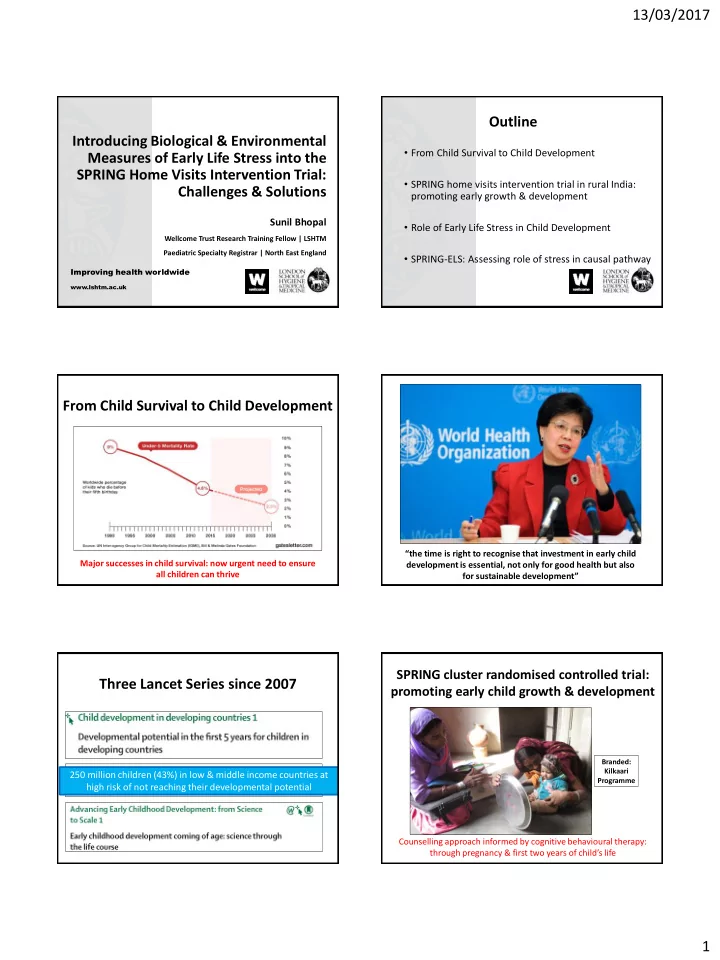

13/03/2017 Outline Introducing Biological & Environmental • From Child Survival to Child Development Measures of Early Life Stress into the SPRING Home Visits Intervention Trial: • SPRING home visits intervention trial in rural India: Challenges & Solutions promoting early growth & development Sunil Bhopal • Role of Early Life Stress in Child Development Wellcome Trust Research Training Fellow | LSHTM Paediatric Specialty Registrar | North East England • SPRING-ELS: Assessing role of stress in causal pathway Improving health worldwide www.lshtm.ac.uk From Child Survival to Child Development “the time is right to recognise that investment in early child Major successes in child survival: now urgent need to ensure development is essential, not only for good health but also all children can thrive for sustainable development” SPRING cluster randomised controlled trial: Three Lancet Series since 2007 promoting early child growth & development Branded: Kilkaari 250 million children (43%) in low & middle income countries at Programme high risk of not reaching their developmental potential Counselling approach informed by cognitive behavioural therapy: through pregnancy & first two years of child’s life 1
13/03/2017 SPRING Cluster Randomised SPRING Monthly Home Visits Controlled Trial • Rewari district : Haryana, India • 24 clusters : 12 intervention | 12 control • Cluster = population served by sub-centre • Total population 96,000 • 5000 mother-child dyads enrolled & followed up • Detailed outcome assessments with 2000 children SPRING Conceptual Framework Outcome Assessments: Length Community & health Improved Improved systems sensitisation Maternal feeding mental well- practices and IMPROVED being care Child behaviours Growth HOME VISITS by CBAs Improved Targeting infant/young child Training and maternal Improved feeding, interaction and play supervision social well- mother-child Counselling /problem solving of CBAs being and interactions Demonstrating skills family support Engaging family IMPROVED Improved Improved play Child maternal and Development efficacy stimulation Job Aids SPRING Implementation: Inputs Impact Intermediate outcomes & Processes outcomes Outcome Assessments: Outcome Assessments: Bayley Scales of Infant Development Bayley Scales of Infant Development 2
13/03/2017 Biological stress measures: Healthy child development can be derailed by adversity & its impact on the stress response systems focus on HPA axis Damaging impact of stress on learning, behaviour & health throughout the lifecourse Cortisol: end product of the hypothalamic-pitiuitary- adrenal axis Peak: 20 mins SPRING Conceptual Framework post-wake + Early Life Stress contribution Improved Improved Maternal feeding mental well- practices and IMPROVED Cortisol being care Child behaviours Growth concentration 1. Impact of SPRING Improved Biological maternal Improved on stress stress social well- mother-child 2. Determinants of measures being and interactions Diurnal rhythm family support biological stress matures from 3 IMPROVED Wake Improved Improved play Child maternal and months of age Development efficacy stimulation Additional stress risk factors Intermediate outcomes Impact outcomes Linear decrease through day. Small peaks post daytime nap Measuring HPA Axis in SPRING Saliva & Hair Sampling: Feasibility • Cortisol diurnal rhythm: Saliva • In-depth interviews • Reflects systemic concentration from 20 minutes previous • (5 mothers, 2 barbers) • Multiple samples: 8am, 12noon & 4pm on two days • Focus group discussions with mothers • Diurnal slope of decrease: mean of two days • (2 groups) • Non-invasive • Piloting techniques • Widely used but minimally in low & middle income countries • (13 children aged 11-13 months) • Chronic cortisol exposure: Hair • 1cm=approx 1 month exposure • Assessing 3cm hair (15-75mg) 3
13/03/2017 Saliva sampling: Variety of techniques Saliva: Findings • No cultural barriers found • Practical findings: • Mothers know the waking times of their children and can tell our assessors • Mothers wanted workers to take sample • Large range of time taken to sample: 10 – 120 seconds • Staying in household all day for sampling: households welcoming but need to consider other tasks for workers to keep them busy Hair: Posterior Vertex Hair: 1-3cm 3cm Hair Hair: solutions • Many cultural barriers to sampling • Involvement of whole family at consenting visit, • Association with evil eye appointment visit & during assessment • Usually cannot sample before ceremonial first • If cannot cut on day 1 of assessment – attempt to haircut (up to three set times per year) do on day 2 • Usually may not sample if mother is pregnant • Increase sample size to account for consent • Usually may not cut hair on: refusals, first haircut not done & short hair • Tuesdays, often not on Thursday or Saturday • Festival days • Fasting days (approx. 10 individual days • Many children have very short hair/shaved head • Suspicion from family – need to involve all household members 4
13/03/2017 Explanatory Framework for Stress Perceived causes of stress • Household violence • Poverty Incorporated into an • Poor hygiene environmental stress • Neglect questionnaire to • Inadequate care complement other • Maternal stress SPRING measures • Sibling abuse/violence • Carer alcoholism Exploring local understanding of infant stress to develop a questionnaire to measure risk-factors for ELS Impacts of adversity Summary • Difficult to predict: some children seem more • Taking saliva & hair: feasible & acceptable resilient than others • To date: 4000 saliva | 800 hair | 1200 questionnaires • Negative impact on growth, development • First large integrated nutrition & development trial to • Leads to fear, behavioural problems include biological measures of stress • Deficits can be reversed – but becomes more • Hair cortisol: first time in young children in South Asia difficult over time • Lesser impact on non-verbal young infants: too young to ‘understand’ Prevention & Treatment through extra love & improved caregiving Thanks & Acknowledgements SPRING Team Funding Wellcome Trust Research Prof Betty Kirkwood (PI & Supervisor) Gauri Divan Sangath Training Fellowship 2015-2018 Reetabrata Roy LSHTM SPRING funded by Bilal Avan LSHTM Wellcome Trust Programme Grant Deepali Verma Sangath Divya Kumar Sangath Zelee Hill UCL Contact http://spring.lshtm.ac.uk Sunil.Bhopal@lshtm.ac.uk Collaborators Twitter: @sunilbhop Bushra Khan , University of Karachi Matt Bristow , Anglia Ruskin University Jane Barlow , Oxford University 5
Recommend
More recommend